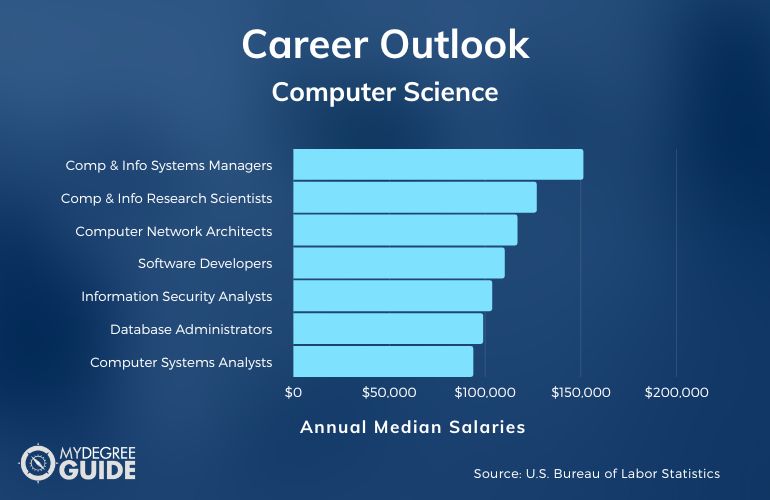You may have the opportunity to take your career in computing and technology to the next level when you earn a part time masters in computer science.

Today’s organizations often depend on the leadership of technology experts who understand the inner workings of computer systems. With a master’s degree in computer science, you may have the chance to show yourself to be a trained, committed professional with the drive and desire to be at the forefront of this field.
Editorial Listing ShortCode:
Whether you want to provide technological solutions to company needs or spearhead new developments in computing, this graduate program may help equip you for the task.
Universities Offering Part Time Masters in Computer Science Degree Programs
Methodology: The following school list is in alphabetical order. To be included, a college or university must be regionally accredited and offer part time degree programs.
Drexel University
Offered by their College of Computing and Informatics, Drexel University has a Master of Science in Computer Science (MSCS) program that requires 45 credits. It covers subjects such as algorithms, intelligent systems, and applied data structures. Students can also earn a dual degree in computer science and any other CCI discipline.
Drexel University is accredited by the Middle States Commission on Higher Education.
Northeastern University
The masters level computer science program at Northeastern University is aimed at students without a background in the subject.
They offer bridge courses to cover the fundamentals as well as evening classes for busy adults who are already in the workforce. Additionally, part of their program involves a 6 month to 8 month internship with Northeastern industry partners, such as Amazon and Google.
Northeastern University is accredited by the New England Commission of Higher Education.
Seattle University
Open to both full-time and part-time students, Seattle University has a computer science masters program with several different focus areas.
Specializations include data science and software engineering. Students without a computer science background can apply after completing a Career Change Certificate in Computer Science Fundamentals program.
Seattle University is accredited by the Northwest Commission on Colleges and Universities.
University of Washington
The University of Washington offers a part-time Master of Science in Computer Science and Engineering degree.
Classes are held in the evenings and cover topics such as programming languages, operating systems, computer graphics, machine learning, and artificial intelligence. The program requires 40 credits and takes an average of 2.5 years to complete.
The University of Washington is accredited by the Northwest Commission on Colleges and Universities.
University of West Florida
The computer science masters program at the University of West Florida can be customized in several ways, including the option of 8 week or 16 week courses.
Students can also choose from different specializations, such as data analytics and software engineering. The program requires 30 credits to complete, and classes can be taken online.
The University of West Florida is accredited by the Southern Association of Colleges and Schools Commission on Colleges.
Part Time Masters in Computer Science

Earning a master’s degree in computer science doesn’t have to be a full-time undertaking. Convenient part-time graduate degree formats can help make it possible for working professionals to keep their regular jobs or to care for their family while also going to school. Some universities even offer evening classes for their programs.
Some part-time college programs are offered through in-person classes on college campuses. The courses may be available in the evenings or on the weekends.
You may also have the option to earn your part-time degree through online classes that are available around the clock. Programs offered by online computer science colleges or a school of engineering often rely on a fast-track calendar that may allow you to speed up the process of earning a degree.
Online and on-campus programs offer similar coursework. You may study computer theories, software, and data analytics. There may be classes that address algorithms, data mining, programming languages, or cloud computing.
If you’re interested in a particular aspect of computer science, you might want to pursue a graduate degree focus or concentration. Possible specializations may include big data or computer security. Even if your school doesn’t offer official concentrations, you may be able to customize your degree program by selecting several related electives.
To wrap up your graduate studies, you might complete a master’s project or write a thesis paper. With a masters degree and work experience, you may be qualified to take on leadership roles in technology departments or computer companies.
Potential jobs include technology director, computer systems manager, network administrator, IT security analyst, or software developer. You may also teach computer science courses or conduct computing research with the potential to fuel cutting-edge innovations.
Part-Time vs. Full-Time Masters in Computer Science Programs

Graduate school may be your primary focus, or it may be an endeavor that fits in alongside other responsibilities. Depending on your availability and preferences, you may choose to commit to a part-time degree program or a full-time one.
Enrollment
Most colleges consider 9 graduate credits per semester to be a full-time course load. Fewer credit hours than that would put you at part-time status. Even as a part-time student, your school may stipulate a minimum number of courses that you have to take each term.
Schools that use quarter-credit hours or shortened terms will often specify a different number of credits for those who are a full time vs part time student. You can contact your school’s registrar’s office to clarify the details for part time students before enrolling in courses.
Another consideration is whether you want to attend school online or on campus at a school of engineering. You’ll have that choice whether you opt for part- or full-time graduate studies. Classes may be offered in the evenings, on the weekends, or—in the case of some online computer science degree programs —around the clock.
Time to Completion

With more classes per term, you’ll likely finish a full-time degree program faster than a part-time one. Traditionally, a masters with a full-time course load takes 1 to 2 years to complete. With part-time studies, it may take 3 years or more.
Some online colleges offer accelerated calendars. In one of those programs, it may take under 18 months to finish full-time studies or around 2 years for a part-time student. Accelerated terms, which are scheduled one after another throughout the year, are often 6, 8, or 10 weeks each.
Pros and Cons
| Part-Time Masters in Computer Science | Full-Time Masters in Computer Science | |
| Pros |
|
|
| Cons |
|
|
Computer Science Careers & Salaries

The deep understanding of computer theories and processes that you may gain in a part time computer science masters program may help prepare you for a number of technology-related jobs.
Computer and information technology occupations are growing at an 11% rate, according to the Bureau of Labor Statistics. Computing experts play critical roles in companies related to information services, software publishing, computer systems design, and data hosting.
Computer science jobs aren’t limited to those fields, though. Technology’s widespread use means that all sorts of organizations rely on the expertise of computer professionals. Retailers, factories, schools, hospitals, banks, and insurance companies, for instance, may all need employees with computer science skills.
According to the Bureau of Labor Statistics, jobs in computers and information technology pay an average annual salary of $91,250.
| Careers | Annual Median Salaries |
| Computer and Information Systems Managers | $151,150 |
| Computer and Information Research Scientists | $126,830 |
| Computer Network Architects | $116,780 |
| Software Developers | $110,140 |
| Information Security Analysts | $103,590 |
| Database Administrators | $98,860 |
| Computer Systems Analysts | $93,730 |
| Computer Programmers | $89,190 |
| Postsecondary Computer Science Teachers | $85,540 |
| Network and Computer Systems Administrators | $84,810 |
The above figures represent national averages, but your salary may vary depending on your employer, experience, job title, and geographic region, among other factors. In whatever organization you’re employed, your computer knowledge may qualify you to be a network architect, an IT director, or a database administrator.
You may also pursue a career paths as a software developer or a computer programmer who helps create operating systems or applications. Advancing computer technology is a significant way that a computer science expert may contribute to this field. Researchers often work for the federal government, computer companies, or universities.
With an online MS in Computer Science, you may be able to teach some college courses on this topic. Community colleges commonly hire faculty members with this level of degree.
Master’s in Computer Science Courses

To earn a part-time CS master’s degree, graduate students may take 10 or more classes that address key concepts in computer science and elective areas of your choosing. Your curriculum may include courses like the following:
- Application and Web Development: Through studies in HTML5 and other internet-related topics, you’ll prepare to design advanced apps or web services.
- Algorithms: In this math-heavy course, you’ll practice designing and analyzing algorithms.
- Artificial Intelligence and Machine Learning: You’ll work with the math that makes machine learning possible and learn how to apply it.
- Data Mining: This course will help equip you with techniques for drawing insights from enormous data sets.
- Database Management: You’ll learn about database structure, try your hand at current database systems, and practice design techniques.
- Programming Principles: You may explore concepts that are universal among all programming languages or enhance your skills with a specific language.
- Protecting Cybersecurity: This class will teach you to protect data, safeguard networks, and design software with security in mind.
- Software Engineering Principles: The concept of software engineering frames the steps of app or system development in terms of the software life cycle.
- System Testing: You’ll learn to maintain quality by running various tests on software systems.
- Visualization Strategies for Data: The skills you gain in this class will help you present data insights to business leaders.
Some of your credits might come from completing a final master’s project or crafting a thesis paper.
Admissions

A master’s program often builds upon prior knowledge of computer concepts, so certain undergraduate prerequisites or relevant work experience may be required. You may demonstrate your readiness for master’s studies through:
- Letters of reference from professional or academic supervisors
- Resume or CV
- Statement of purpose
- Transcripts from undergraduate program and any graduate courses
Some colleges request GRE scores as well, but this isn’t a universal requirement for computer science programs. Other colleges put more stock in criteria like your undergraduate GPA and your work experience. Even at a school that requests test scores, you might qualify for a waiver.
Note that you may see a difference in admissions requirements with computer engineering vs. computer science programs.
Accreditation

Regional accreditation lets you know that a college meets quality standards. To become accredited, schools have to be evaluated by an approved accrediting agency. The US has seven of these regional accreditors.
If a school meets the agency’s standards, it can then bill itself as a regionally accredited college. Regular reevaluations ensure that accredited schools maintain their high quality.
Accreditation may have several benefits for you as a student. It is more likely that your credits can transfer to another school or qualify you for doctoral studies. An accredited degree may also look better on your resume.
Financial Aid & Scholarships

Financial support may help you realize your goal of earning a part time MS in Computer Science.
Both on-campus and online programs are typically eligible for government student aid, such as grant or loan programs. The Free Application for Federal Student Aid (FAFSA) can help you navigate federal assistance and may qualify you for state help as well.
You might also consider applying for scholarships and fellowships. Winning such awards might reduce your tuition burden or pay for educational extras, such as conference registration.
There might also be a tuition program offered by your employer. Some workplaces renew their financial support each semester, which can be a boon for part-time students.
How Many Credits Is a Part Time Masters in Computer Science Program?

Graduate schools usually consider 9 credit hours or more per semester to be a full-time course load. Anything less than that is often classified as part-time enrollment.
Either way, you’ll need to earn the same number of credits before graduation. Many schools require 30 credits, but some programs have higher degree requirements.
What Can You Do with a Master’s in Computer Science?

Graduating with a master’s in computer science may lead to lucrative job opportunities in this booming field. Companies are often eager to hire industry leaders with advanced computing knowledge.
According to the Bureau of Labor Statistics, computer and information systems managers earn between $90,430 and $208,000 annually. The highest average salaries are for management positions in the information sector.
The average annual salary for computer and information research scientists is $126,830. The federal government employs over one-quarter of computer researchers. Information security analyst is one of the most in-demand roles right now. Positions are growing at a 31% rate. The pay usually ranges from $60,060 to $163,300.
How Many Years Does It Take to Get a Master’s Degree in Computer Science?

Typically, it takes 4 semesters of full-time study to complete a master’s degree. That’s a 2 year process. When spreading your studies out over more semesters as a part-time student, it may take 3 to 5 years to complete your degree requirements.
For either full- or part-time enrollment, attending an online college with accelerated terms may reduce your overall program length.
Is a Masters in Computer Science Worth It?
Yes, a master’s degree in computer science is worth it for many students. Jobs in In the computer and information technology field are projected to grow at a rate of 11% in the next 10 years (Bureau of Labor Statistics), faster than the average job growth of all occupations.
Common computer science career paths include computer systems manager, computer science researcher, computer network architect, software developer, and information security analyst. This is a fast-growing field, and work opportunities may be available in technology companies as well as other industries.
Having a master’s degree may even prepare you for leadership roles in financial, educational, healthcare, business, government, or nonprofit institutions.
Earning Your Masters in Computer Science Online

Jobs in technology such as computer science and computer engineering are booming, and experienced, educated industry leaders are especially needed. You may prepare to make your mark in this field by earning a master’s degree in computer science.
You don’t need to wait for the perfect moment to get started. With a part-time master’s, busy students and working professionals may be able to balance school and the other components of their lives. Plus, if you feel it would benefit you to continue on to earn your doctorate degree, a growing number of universities offer part time PhD in Computer Science programs that may be better suited to your work schedule.
For the highest level of flexibility, you may consider choosing an online computer science masters program. You may earn the same quality of education from accredited online computer science colleges as you would in a brick-and-mortar classroom. Plus, some universities even offer online masters in computer science with no GRE required.
Also, if computer science was not your undergraduate major, you can explore the online masters in computer science for non CS majors that some universities offer.
You may want to take a look at various online computer science degrees for part time students that are right for you.
